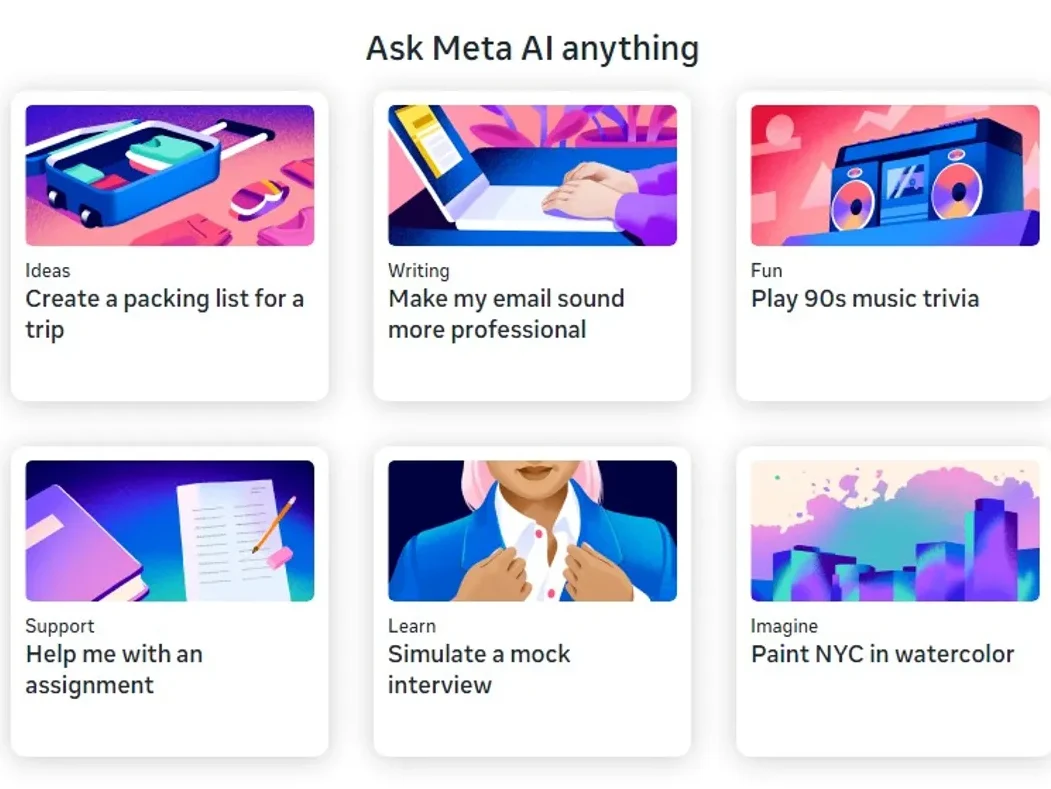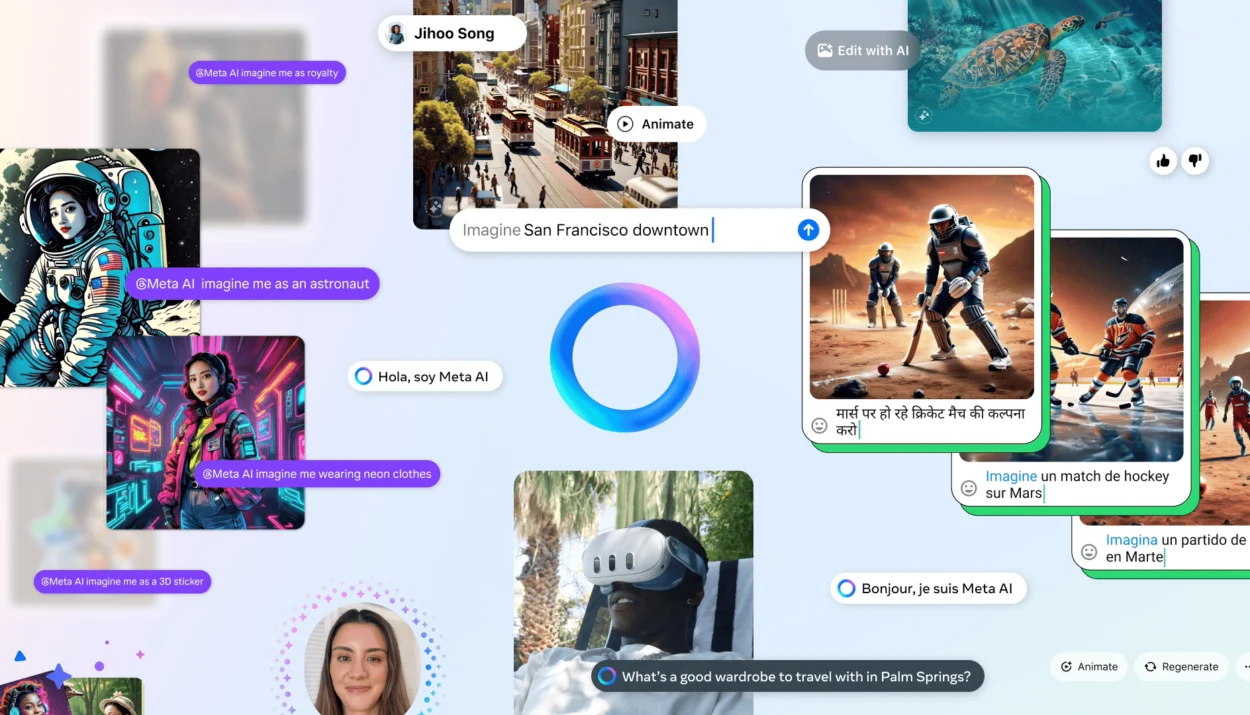Meta AI is the artificial intelligence research division of Meta Platforms, Inc., formerly known as Facebook. The team focuses on advancing the state of AI to power Meta’s suite of social media applications and other future AI-driven technologies. Meta AI is dedicated to pushing the boundaries of AI research in areas such as natural language processing, computer vision, robotics, and machine learning, with an emphasis on open science and collaboration.
Meta AI’s innovations play a critical role in improving user experiences on platforms like Facebook, Instagram, and WhatsApp, from personalized content recommendations to real-time translation and security enhancements. The goal of Meta AI is not only to create intelligent systems for its platforms but also to contribute to the global AI community through open research and sharing of its breakthroughs.

Meta AI\ZDnet
How Does Meta AI Work?
To understand how Meta AI works, it’s essential to explore the various research domains and technologies that drive the organization’s AI advancements. These efforts aim to solve some of the most complex problems in artificial intelligence, from natural language understanding to making AI systems more accessible and safe.
1. Natural Language Processing (NLP)
Meta AI focuses heavily on Natural Language Processing (NLP) to improve communication and interaction across its platforms. This includes work on large language models similar to GPT, which can generate human-like text, understand context, and translate between languages in real-time.
- Translation and Multilingual AI: Meta AI has developed translation systems that work across multiple languages, including low-resource languages, making communication easier for users across different cultures. Its NLP models are designed to handle these tasks at a large scale, given the billions of active users across Meta platforms.
2. Computer Vision
Another significant area for Meta AI is computer vision, which allows machines to interpret and understand visual data like photos and videos. Meta uses computer vision to power features such as automatic image tagging, content moderation, and AR/VR experiences.
- Content Moderation: One of Meta’s most impactful uses of computer vision is in identifying inappropriate content, such as hate speech or violence, across its platforms. AI models scan millions of posts daily, filtering out harmful content before it reaches users.
3. AI for Social Interaction
Meta AI is also advancing AI systems to make social interactions more immersive and intuitive. This includes enhancing virtual reality (VR) and augmented reality (AR) experiences. Meta’s Reality Labs research, in partnership with Meta AI, explores the future of social interaction in virtual environments, such as the metaverse.
- AI in the Metaverse: Meta AI aims to build intelligent systems that enhance users’ experiences in the metaverse, where digital and physical worlds blend. This includes AI-powered avatars and more interactive virtual spaces, creating deeper, more meaningful connections.
Challenges Facing Meta AI
Despite its breakthroughs, Meta AI faces several challenges in its quest to create scalable and trustworthy AI systems. From privacy concerns to the ethical implications of AI in social media, these challenges require careful consideration and innovative solutions.

1. Data Privacy and Security
Given Meta’s extensive access to personal data, one of the biggest challenges is data privacy. The use of AI models to analyze and predict user behaviour raises concerns about how personal data is collected, stored, and used.
- User Consent and Data Usage: Meta AI must balance its need for large datasets to train AI models with the obligation to protect user privacy. The challenge lies in building transparent systems that respect user consent while still providing the personalized experiences users expect on platforms like Facebook and Instagram.
2. Bias in AI Models
Bias is a major concern in AI systems across the industry, and Meta AI is no exception. AI models, including those developed by Meta, are only as good as the data they are trained on. If the training data reflects societal biases, the models may inadvertently perpetuate these biases in their outputs.
- Addressing Algorithmic Bias: Meta AI works on developing systems that can detect and mitigate biases in algorithms. However, identifying biases across large-scale models, especially those involving global users, remains a significant challenge.
3. Content Moderation and Misinformation
AI-powered content moderation is crucial for a platform like Facebook, but it comes with its own set of challenges. While Meta’s AI can detect and remove harmful content, distinguishing between harmful speech and free expression is difficult.
- Combatting Misinformation: AI plays a central role in detecting fake news and misinformation. However, the constantly evolving nature of misinformation campaigns, combined with the complexity of natural language, makes it difficult for AI models to keep up, especially on a global scal.
4. Scalability
Meta AI handles enormous amounts of data and must scale its AI systems to serve billions of users worldwide. This creates challenges in maintaining performance, accuracy, and efficiency as the demand for more sophisticated AI-driven features grows.
- Computational Costs: Training large AI models, such as those used for content moderation or translation, requires vast computational resources. Ensuring that these models can run effectively across Meta’s platforms without overwhelming resources is a significant technological hurdle.

5. Ethical AI Development
Developing ethical AI is a top priority, but the sheer complexity of global social platforms makes this a daunting task. Meta AI must ensure that its systems uphold values like fairness, accountability, and transparency across different regions and cultural contexts.
- Fairness and Accountability: Meta AI faces the challenge of building systems that serve all users fairly, regardless of their background or geographic location. This involves not only mitigating bias but also ensuring that AI decisions are transparent and accountable.
Meta AI’s Innovations and Breakthroughs
Despite the challenges, Meta AI has achieved remarkable breakthroughs, many of which have become integral to Meta’s operations and influence on global AI development.
- PyTorch: Meta AI developed PyTorch, one of the most widely used open-source deep learning frameworks. It is now a crucial tool in AI research globally, enabling developers and researchers to build and train AI models quickly and efficiently.
- Self-Supervised Learning: One of Meta AI’s innovations is its work in self-supervised learning, where AI models can learn from raw data without needing labelled datasets. This approach allows for more scalable AI development and is particularly useful for improving systems like language models and content recommendation algorithms.
What Can Meta AI Be Used For?
Meta AI’s work has far-reaching implications for several industries, thanks to its advancements in artificial intelligence. Here are some areas where Meta AI is making a significant impact:
- Social Media Personalization: By analyzing user data, Meta AI provides personalized content, such as news feeds, advertisements, and suggested connections, enhancing user engagement across platforms like Facebook and Instagram.
- Content Moderation: Meta AI automates content moderation, flagging inappropriate or harmful content while still respecting freedom of speech.
- Virtual and Augmented Reality: AI powers Meta’s VR and AR features, improving immersive experiences and creating interactive environments for users in the metaverse.
Related articles:
- AI travel planner – the best way to save your time and money
- What is generative AI and how does it work?
- Jobs That AI Can’t Replace: The Essential Human Skills for the Future
- What Jobs Will AI Replace by 2030?
- Future of Electric Vehicles: What to Expect by 2030
- The Benefits of Virtual Reality Beyond Gaming
- Who Owns the Metaverse? Exploring Ownership and Governance in Virtual Worlds
- How to Use Facebook for Marketing: A Comprehensive Guide
Sources:










